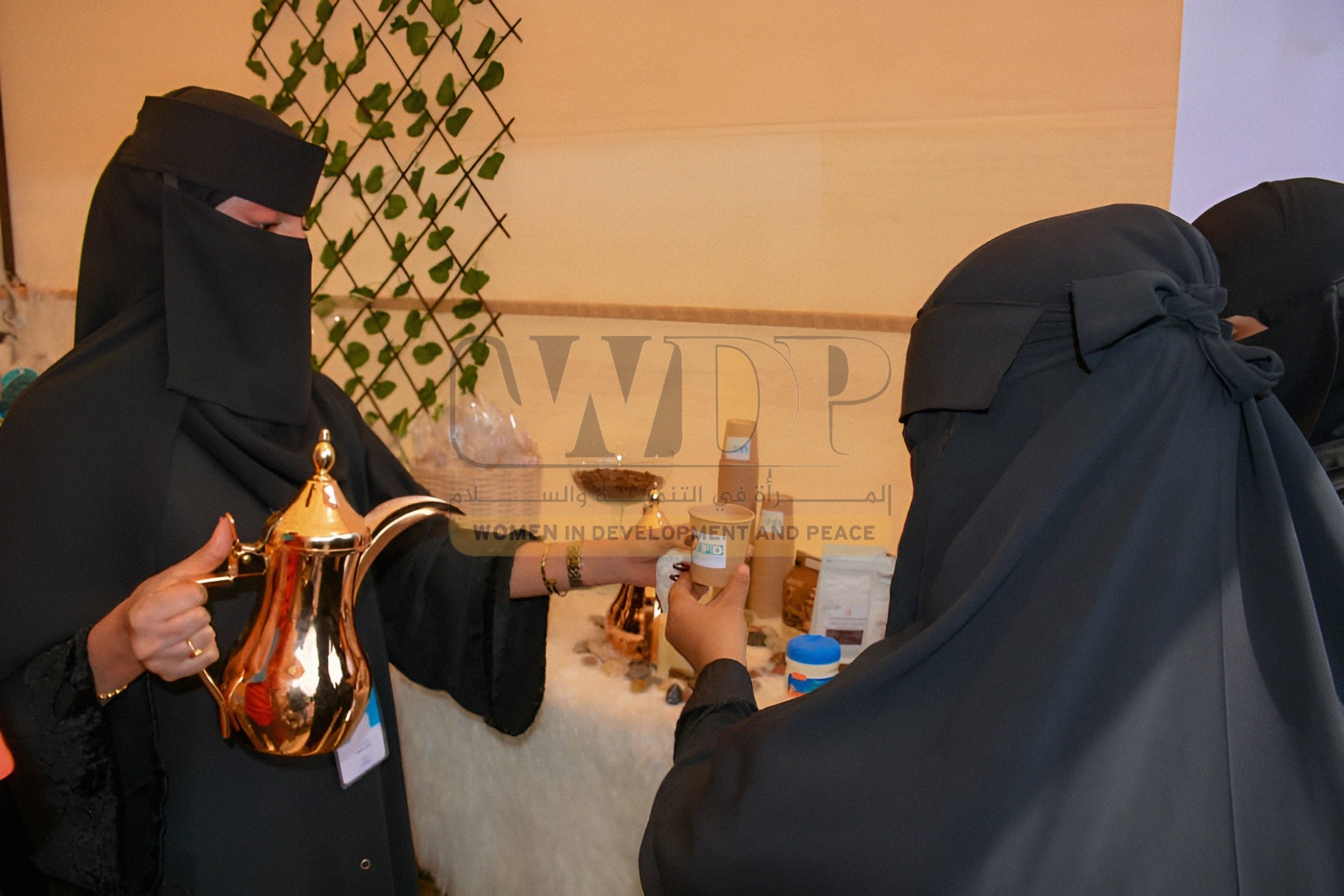Women in Development and Peace – Yasmine Abdulhafeez
Many Yemeni women have shaken off the dust of customs and traditions to confront the numerous challenges imposed by the harsh reality the country has been experiencing for several years. These challenges include the deterioration of living standards for the majority of families in Yemen, due to the collapse of the local currency against foreign currencies, the suspension of salaries for employees, the disruption of some public and service institutions of the country, the collapse of many public and private projects, and other problems faced by Yemeni citizens.
In response, some women have ventured out to seek suitable job opportunities, while others have decided to open their own businesses, whether working from home or outside in various fields such as food, fashion, perfumes, and handicrafts. They have also opened shops to provide various services in the field of electronic engineering or selling clothes and other items.
All these opportunities that women have resorted to were and still are a lifeline to save themselves and their families from the poverty and hardship that besiege citizens in Yemen in general. They have decided to improve their income and then move towards leadership and participation in improving the country’s collapsing economy.
Yemeni women are achieving success in the field of entrepreneurship and economic empowerment. However, despite these successes, many obstacles prevent them from continuing their economic work. They face the struggle of social heritage and the narrow view of society towards their commercial activity, in addition to the doubling of their suffering due to the lack of funding, currency differences, and the security situation in the country.
A Glimpse of Social Heritage Impact
Social heritage in Yemen reveals one of the significant challenges faced by women and girls. Women grapple with societal constraints, particularly in certain regions governed by a culture of stigma. In these areas, women venturing into the workforce contradicts societal beliefs that view women solely in homemaking and child-rearing.
Muna Isma’il (a pseudonym) is one of the young women who confronted this social heritage, which initially hindered her dream of working in the field of commerce. Despite her family’s opposition, she opened a small shop in her village, offering clothing and accessories for women and girls.
Muna, who has three older brothers, hails from a relatively well-off family in a rural area of Taiz Governorate. After completing high school, she aspired to pursue higher education but faced challenges due to the absence of nearby institutes or universities. Her social circumstances made it difficult to travel to the city for education, especially as she hails from a conservative family.
Muna shares her experience: “Although I could easily start my own business due to the available capital, my family rejected the idea from the outset. In our village, women are not granted the authority to be businesswomen; that privilege is reserved for men. Women are expected to work within their homes, taking care of their husbands, and families, and engaging in tasks like agriculture, livestock rearing, fetching water, and gathering firewood.”
She adds, “Every time I discussed the idea of opening a business with my family, especially my mother and father, their responses were disheartening. They would say, ‘What do you need money for? We’ve provided everything you require.’ They worried about societal judgment, saying, ‘Women don’t go out to work or engage in trade.’ Their discouraging words weighed heavily on me.”
According to social expert Ridhwan Al-Tamimi, the impact of social heritage significantly affects the status of businesswomen in Yemen. These effects vary based on customs and traditions from one region to another and depend on the family’s specific cultural context.
Al-Tamimi explains that Yemeni customs and traditions in some areas do not encourage women to work in any field. Women lack encouragement and are not entrusted with the necessary confidence to work outside the home or become businesswomen. However, in certain regions, some women receive limited encouragement due to increased awareness within their families. Consequently, they later become pioneering businesswomen across various domains.
 Isam Al-Ahmadi, President of the Social Workers Association, highlights the numerous challenges faced by businesswomen in Yemen due to social and familial factors. These challenges include cultural norms, societal perceptions of women, balancing professional and family life, and the customs and traditions of certain families that prohibit women from working or interacting with others.
Isam Al-Ahmadi, President of the Social Workers Association, highlights the numerous challenges faced by businesswomen in Yemen due to social and familial factors. These challenges include cultural norms, societal perceptions of women, balancing professional and family life, and the customs and traditions of certain families that prohibit women from working or interacting with others.
He suggests solutions to address these challenges, including encouraging social and economic support for women, facilitating financial funding through accessible loans, and supporting women who aspire to start their own businesses. Additionally, raising societal awareness about the vital role of women in development and community building is essential.
Continuous Success Despite Challenges
Areej Yahya Al-Shaikh (Director of Lody VIP Foundation for Event and Conference Management and Exhibitions) explains that Yemeni women have played a significant role in supporting the country’s economy over long periods. This is evident through numerous large-scale economic projects, such as real estate, contracting, import, and export ventures. These endeavors contribute to improving the country’s economic situation and the living standards of families. Yemeni women have maintained their roles as homemakers, wives, and mothers while demonstrating courage in making economic decisions for the nation.
She adds: ‘Despite this, they face many challenges and difficulties that hinder their work. These include societal biases against women, restrictive legal texts that limit their freedom in certain aspects, and the overall instability faced by the country. Challenges related to imports, exports, customs, taxes, and currency fluctuations persist. Nevertheless, some projects continue to thrive.’
She emphasizes that there are solutions to overcome these difficulties. Simplifying government transactions and procedures, amending legal texts to support successful and robust projects specifically for women, and providing guidance and encouragement through specialized economic entities can help women navigate obstacles. Their seriousness in the job market contributes to the country’s economic stability.
 Dr. Manar Muneer Al-Janahi (a pioneering businesswoman, trainer, and consultant in the field of economic empowerment and investment for both men and women) states: ‘Yemeni women play a crucial role in economic empowerment within Yemen. This is evident from projects that emerged during times of conflict. Some families lost their government income sources and faced salary cuts due to the pandemic. Despite this, women harnessed their latent energy and employed it in their own projects, providing income for their families amidst current circumstances.’
Dr. Manar Muneer Al-Janahi (a pioneering businesswoman, trainer, and consultant in the field of economic empowerment and investment for both men and women) states: ‘Yemeni women play a crucial role in economic empowerment within Yemen. This is evident from projects that emerged during times of conflict. Some families lost their government income sources and faced salary cuts due to the pandemic. Despite this, women harnessed their latent energy and employed it in their own projects, providing income for their families amidst current circumstances.’
She continues: ‘These projects have also employed many female workers, including those from single households, those with limited income, and those who lacked sufficient education to find employment. The participation of Yemeni women in economic empowerment is essential for lifting the local economy and achieving economic stability.’”
Challenges and Difficulties
Businesswoman Manar Muneer Al-Janahi highlights the key challenges and difficulties faced by Yemeni businesswomen. These include negative cultural and societal norms, psychological pressures at home and work, as well as the struggle to balance their business endeavors with family responsibilities. Additionally, self-empowerment and psychological support for businesswomen are lacking.
Among the challenges is the lack of security stability in the country due to ongoing conflict in various Yemeni provinces. The impact of this conflict extends to crucial economic sectors, resulting in fluctuating dollar prices, scarcity of raw materials due to import difficulties, financial illiteracy, and the absence of specialized advisory committees to facilitate businesswomen’s projects. These committees could provide real solutions to their administrative, financial, and commercial challenges.
Regarding possible suggestions to overcome some of these challenges, Al-Janahi emphasizes the importance of raising awareness among businesswomen in society. They are partners in building the local economy and play a crucial role in driving economic development. Additionally, providing psychological support to businesswomen is essential to help them navigate stages of frustration and depression that can lead to project losses and imbalances in their lives. Furthermore, it’s crucial to educate them about the importance of involving their families in supporting them to overcome all the difficulties they face.”
Furthermore, she added: ‘The importance of activating training courses and effective workshops in the field of time management and risk management for businesswomen cannot be overstated. These initiatives enable businesswomen to balance their time, manage their challenges, and devise innovative and effective solutions both at home and in their work. It is essential to engage relevant and specialized entities to empower them autonomously, allowing them to navigate their project’s environment, overcome challenges, and maintain stability for their families and businesses.
As Al-Janahi sees it, one of the solutions is to assist businesswomen by providing protection and advocating for them, especially those businesswomen who deal with traders. This ensures the safeguarding of their financial rights and prevents exploitation or deception.
She also emphasized the importance of coordination between businesswomen and the Ministry of Industry to find alternative solutions for procuring essential raw materials. Additionally, regulating and standardizing prices among wholesalers is crucial.
Al-Janahi calls for the establishment of a specialized advisory committee dedicated to managing businesswomen. This committee should have real authority to provide appropriate consultations as genuine solutions to their challenges, facilitate their project endeavors, connect businesswomen with various commercial segments of society, and contribute to strong local economic empowerment.
Concluding her remarks, Al-Janahi states: ‘Yemeni businesswomen are resilient, patient, strong, and capable of standing firm against all challenges and difficulties. They have demonstrated their presence in the field of economic empowerment with competence during tough times in Yemen. Some of them have achieved success both locally and internationally. Furthermore, they have proven that Yemeni women entrepreneurs are prominent and empowered, contributing to lifting the local economy and driving development in Yemen.’

